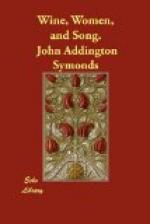“Aestimetur laicus ut brutus,
Nam ad artem surdus est et mutus.”
“Litteratos convocat decus
virginale,
Laicorum execrat pectus bestiale.”
In a parody of the Mass, which is called Officium Lusorum, and in which the prayers are offered to Bacchus, we find this devout collect:[7]—“Omnipotens sempiterne deus, qui inter rusticos et clericos magnam discordiam seminasti, praesta quaesumus de laboribus eorum vivere, de mulieribus ipsorum vero et de morte deciorum semper gaudere.”
The English version of this ribald prayer is even more explicit. It runs thus:—“Deus qui multitudinem rusticorum ad servitium clericorum venire fecisti et militum et inter nos et ipsos discordiam seminasti.”
It is open to doubt whether the milites or soldiers were included with the rustics in that laity, for which the students felt so bitter a contempt. But the tenor of some poems on love, especially the Dispute of Phyllis and Flora, shows that the student claimed a certain superiority over the soldier. This antagonism between clerk and rustic was heartily reciprocated. In a song on taverns the student is warned that he may meet with rough treatment from the clodhopper:[8]—
“O clerici dilecti,
Discite vitare
Tabernam horribilem,
Qui cupitis regnare;
Nec audeant vos rustici
Plagis verberare!
“Rusticus dum se
Sentit ebriatum,
Clericum non reputat
Militem armatum.
Vere plane consulo
Ut abstineatis,
Nec unquam cum rusticis
Tabernam ineatis.”
The affinities of the Wandering Students were rather with the Church than with laymen of any degree. They piqued themselves upon their title of Clerici, and added the epithet of Vagi. We shall see in the sequel that they stood in a peculiar relation of dependence upon ecclesiastical society.
According to tendencies prevalent in the Middle Ages, they became a sort of guild, and proclaimed themselves with pride an Order. Nothing is more clearly marked in their poetry than the esprit de corps, which animates them with a cordial sense of brotherhood.[9] The same tendencies which prompted their association required that they should have a patron saint. But as the confraternity was anything but religious, this saint, or rather this eponymous hero, had to be a Rabelaisian character. He was called Golias, and his flock received the generic name of Goliardi. Golias was father and master; the Goliardi were his family, his sons, and pupils. Familia Goliae, Magister Golias, Pueri Goliae, Discipulus Goliae, are phrases to be culled from the rubrics of their literature.
Much has been conjectured regarding these names and titles. Was Golias a real person? Did he give his own name to the Goliardi; or was he invented after the Goliardi had already acquired their designation? In either case, ought we to connect both words with the Latin gula, and so regard the Goliardi as notable gluttons; or with the Provencal goliar, gualiar, gualiardor, which carry a significance of deceit? Had Golias anything to do with Goliath of the Bible, the great Philistine, who in the present day would more properly be chosen as the hero of those classes which the students held in horror?




